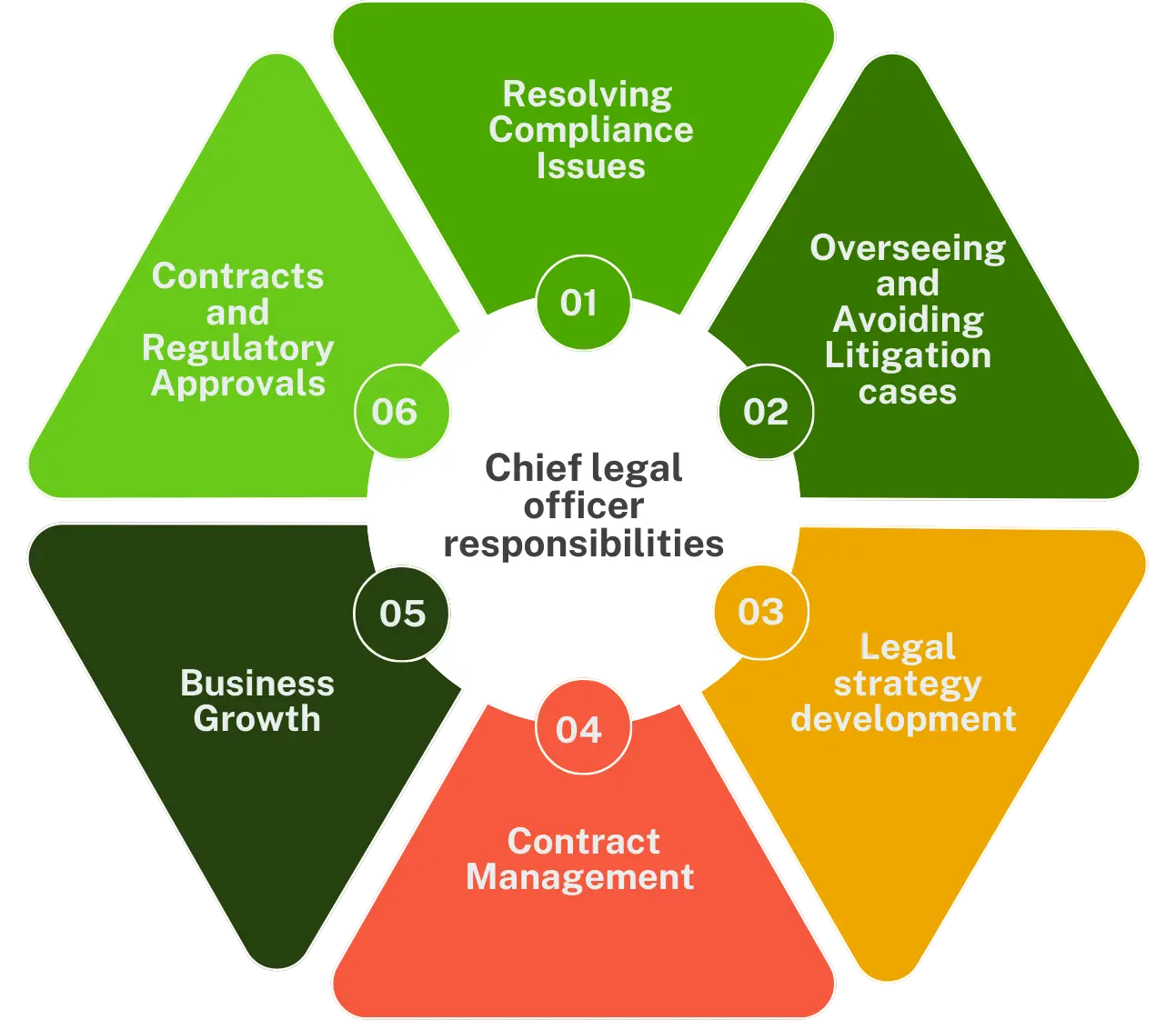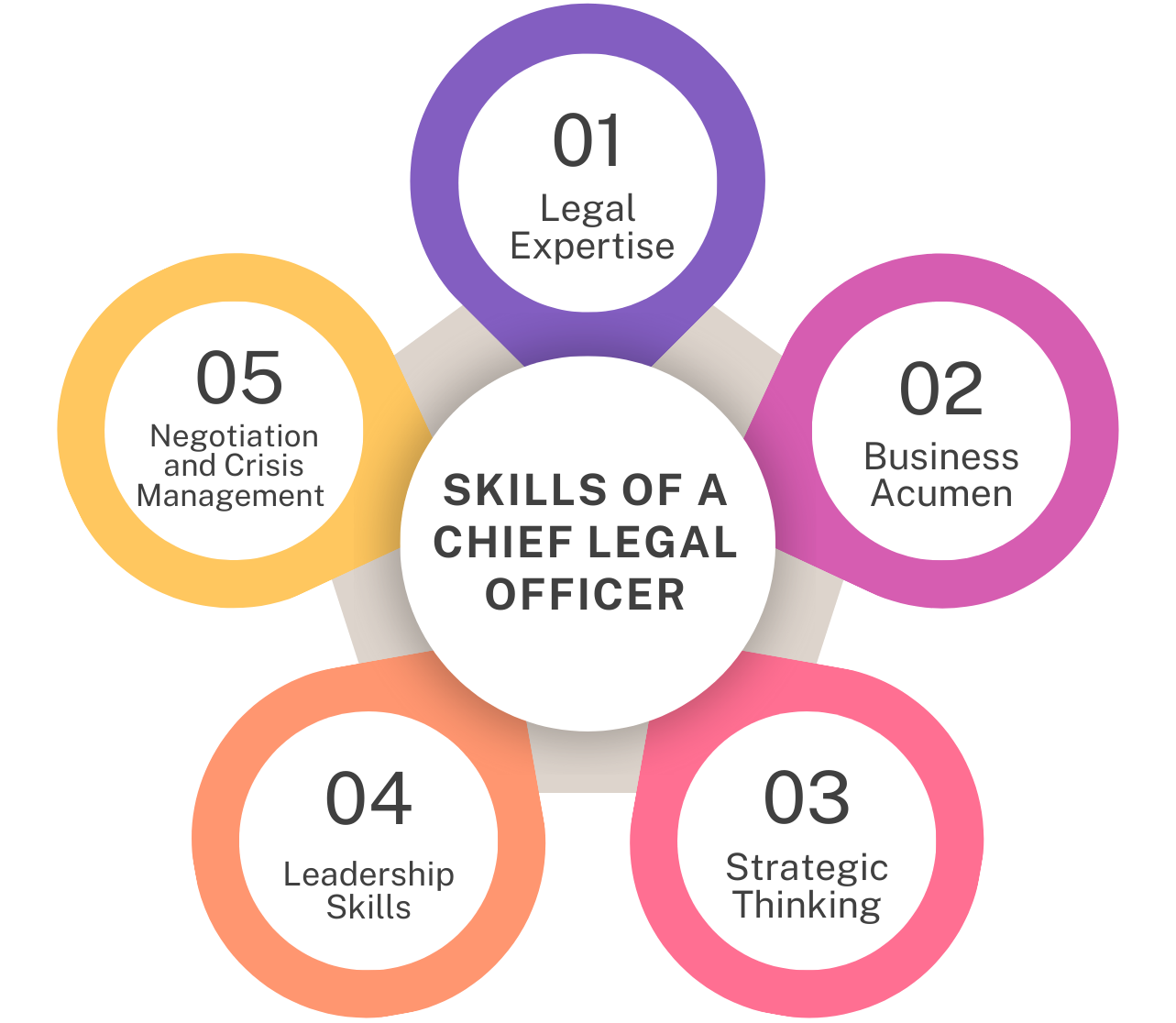Imagine a ship sailing through rough seas, with strong winds of change and waves of rules trying to steer it off course. The Chief Legal Officer (CLO) is like the captain of the ship, carefully navigating through these challenges. They keep a watchful eye on the horizon, ensuring the ship stays on course.
They play a key role in guiding the company. They help the organization stay on track, ensuring it meets legal and ethical standards. This blog will explore the CLO’s main responsibilities and the skills needed for the role. We’ll look at how they lead the organization through legal and ethical challenges.
What is a Chief Legal Officer (CLO)?

A Chief Legal Officer is the senior executive in charge of managing a company’s legal matters and ensuring that it follows all laws and regulations. In addition to handling legal issues, the CLO works to align legal strategies with the company’s business goals, reduce risks, and encourage ethical behavior. Their main responsibilities include managing contracts, intellectual property, lawsuits, corporate governance, and regulatory compliance. They also oversee internal legal teams, work with outside legal advisors and the General Counsel, and manage the company’s legal budget.
The CLO reports directly to the CEO or the board of directors. They are responsible for making sure that legal aspects are considered in all important decisions. They combine their legal knowledge with business strategies to help the company grow and remain strong in the long term. Their role is essential in guiding the company through both legal challenges and business opportunities, ensuring that legal risks are managed effectively while supporting overall business success.
Related Article: Role of a General Counsel: What Does a GC Do?
The Role of a CLO in an Organization

The head legal officer plays an important role in an organization, with responsibilities that include providing strategic leadership, managing risk, and improving operational efficiency. Some of their key duties are:
Leading the Strategic Charge:
- Business Partnership: By working closely with the executive team, legal strategies are tailored to support the company’s broader business goals. This ensures that legal decisions align with the company’s growth and success.
- Risk Assessment: They identify potential legal risks early on and develop clear plans to minimize or avoid them. This helps protect the company from costly legal issues down the line.
- Innovation Catalyst: While supporting new ideas and business ventures, they ensure that the company stays within legal and ethical boundaries. This allows the company to innovate confidently without worrying about legal setbacks.
Legal Compliance Check:
- Regulatory Compliance: Ensuring the organization follows all relevant laws and regulations, including those related to data privacy, competition, and securities.
- Contract Management: Managing the entire process of negotiating, drafting, and executing contracts, often with the help of contract management software.
- Intellectual Property: Protecting the organization’s intellectual property, such as patents, trademarks, and copyrights, to maintain its competitive edge.
- Litigation Management: Creating a clear strategy for handling legal disputes, ensuring it supports the organization’s goals while balancing risk and costs effectively.
Transparent Leadership Style:
- Transparent Leadership Style: Effective leadership in legal matters requires transparency, ensuring that all decisions are clear and aligned with the company’s values and objectives.
- Board Advisory: Providing legal guidance to the board of directors on matters like corporate governance, executive compensation, and shareholder rights is crucial for helping the board make well-informed and legally compliant decisions.
- Ethical Conduct: Promoting ethical business practices is key to maintaining integrity within the organization. This includes ensuring adherence to corporate codes of conduct and compliance with all relevant laws.
- Crisis Management: Leading the company through legal or reputational crises involves aligning legal strategies with broader business goals. This approach helps mitigate risks and ensures operational efficiency during challenging times.
Related Article: 6 Key Performance Indicators (KPIs) for Legal Departments
Chief Legal Officer Salary: Compensation and Benefits

The Chief Legal Officer position typically offers a high salary, which reflects the significant responsibilities, expertise, and strategic value they bring to the organization. The exact salary can vary based on several factors, including the industry, size of the company, location, and experience. Here’s a general idea of what the salary range might look like per year:
| Years of experience | Base compensation (in USD) | Bonus (in USD) | Equity (in USD) |
| 11 – 15 | $282,875 | $88,750 | $233,353 |
| 16 – 20 | $395,917 | $126,833 | $153,386 |
| 25+ | $365,000 | $182,417 | $315,729 |
They can achieve substantial financial success throughout their careers. With their strategic role and legal expertise, they often receive significant compensation packages, including base salaries in the six-figure range, large bonuses, stock options, and other benefits.
As they gain experience, their earning potential increases, with seasoned professionals earning over $860,000 annually. Over a lifetime, a successful individual in this role can accumulate millions, highlighting the substantial financial rewards that come with this executive position.
Skills and Qualifications of a CLO

To be successful as a Chief Legal Officer, individuals need a mix of legal knowledge, business understanding, and leadership abilities:
- Legal Expertise: A strong understanding of corporate law, contract law, intellectual property, and other key areas. This knowledge helps CLOs navigate complex legal matters, ensure the organization stays compliant, protect its assets, and give advice that supports business goals.
- Business Acumen: The ability to understand business challenges and turn them into practical legal solutions.
- Strategic Thinking: A forward-thinking mindset that helps identify potential legal risks and opportunities. This ability allows them to anticipate challenges, align legal strategies with business objectives, and offer insights that drive growth and stability.
- Leadership Skills: The ability to lead and inspire legal teams, collaborate with other executives, and influence decision-making at the highest levels.
- Negotiation & Crisis Management Skills: Essential for securing favorable contracts, settling disputes, and managing high-pressure situations. They use these skills to protect the organization’s interests, minimize risks, and maintain stability during difficult times.
Related Article: How to Manage Legal Teams? 8 Strategies for Effective Management
The Future of the Chief Legal Officer

As the business landscape continues to evolve, so too do the roles. Emerging trends and challenges are shaping the future of this critical position:
| Trend | Impact on the Role |
| Digital Transformation | He must navigate the legal implications of data privacy, cybersecurity, and artificial intelligence. |
| ESG and Sustainability | They play a key role in ensuring compliance with ESG regulations and promoting sustainable business practices. |
| Global Operations | CLOs in multinational organizations must manage complex legal and regulatory issues across different jurisdictions. |
| Increased Regulatory Scrutiny | They must stay abreast of evolving regulations and anticipate potential enforcement actions. |
Related Article: How Does AI Limitations Impacting Contract Management?
Conclusion
The Chief Legal Officer is a vital strategic partner in today’s complex business environment. By providing sound legal advice, managing risk, and ensuring compliance, they play a crucial role in driving organizational success. As the role continues to evolve, they must adapt to emerging challenges and opportunities, leveraging technology and innovation to remain at the forefront of legal leadership.
FAQs
What is the role of the Chief Legal Officer?
The Chief Legal Officer (CLO) oversees a company’s legal matters, ensuring compliance with laws, managing risks, and aligning legal strategies with business goals.
Is the Chief Legal Officer (CLO) higher than the General Counsel (GC)?
The CLO is typically a higher-ranking position, often reporting to the CEO or board of directors, while the GC may report to them in some organizations.
What is the difference between a CLO and a CEO?
The CLO focuses on managing legal risks and ensuring compliance, while the CEO is responsible for the overall strategy and operations of the company.
How much does a CLO earn?
The average salary for a Chief Legal Officer is approximately $395,917 per year.
What skills are needed to become a CLO?
A CLO needs legal expertise, business acumen, strategic thinking, leadership skills, and strong negotiation and crisis management abilities.





